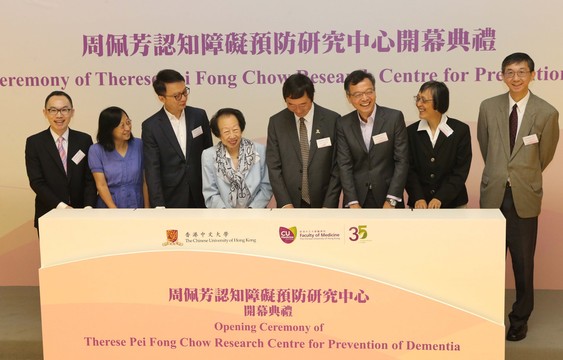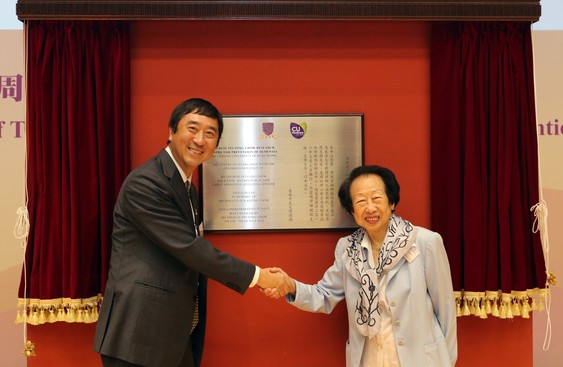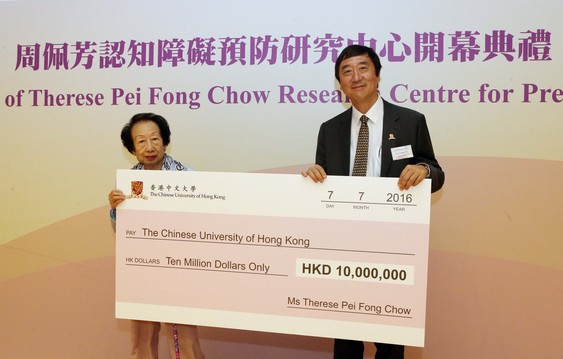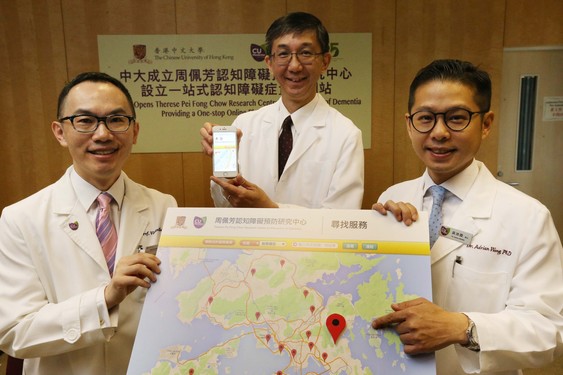News
CUHK Opens Therese Pei Fong Chow Research Centre for Prevention of Dementia
7 JUL 2016
The Faculty of Medicine at The Chinese University of Hong Kong (CUHK) has established Hong Kong’s first dementia prevention research centre - the Therese Pei Fong Chow Research Centre for Prevention of Dementia - through a generous donation from Ms. Therese Pei Fong Chow. The aim of the Centre is to prevent or delay onset of dementia through innovative research and education, and develop and promote effective preventive strategies or treatments. In addition, the Centre has set up a website allowing the public to find nearby centres with dementia services on a point-to-point mapping system and acting as a hub for self-assessment.
Dementia affects one in every ten older adults in Hong Kong and is a major threat to the quality of life of patients and their families. With the rapidly ageing population in Hong Kong, the number of older people with dementia is estimated to rise dramatically from about 100,000 in 2009 to over 330,000 in 2039. This increase urgently calls for effective measures for prevention and treatment of this disease.
Strengthen dementia research in the Chinese population; Identify high-risk subjects
Chinese people differ significantly from Western people in genetic makeup, lifestyle, and educational attainment, but still much of dementia research comes from the West and therefore there is a great need for more research in dementia prevention among Chinese people.
There is good evidence to show that dementia can be prevented. Brain pathologies of common dementing diseases, namely Alzheimer’s disease, cerebral small vessel disease and Parkinson’s disease, have recently been found to harbour in the brain for around 10-15 years before the emergence of symptoms. Simple and valid methods to identify these high-risk subjects and clinical trials targeting this pre-dementia stage are urgently needed.
Dementia Prevention through Research and Education
Donor Ms. Therese Pei Fong Chow, addressing the opening ceremony of the Centre, said, ‘A couple of my family members have dementia, which lead me as a layman to learn about the cause of this affliction. This is the basis of my donation in support of the Research Centre for Prevention of Dementia at CUHK, in memory of my brother Donald Huk Keung Chow.’
The four major objectives which the Therese Pei Fong Chow Research Centre for Prevention of Dementia is set to serve are:
- to identify novel risk or protective factors of dementia and Parkinsonism;
- to identify biomarkers for early detection of Alzheimer’s and cerebral small vessel disease;
- to evaluate potential effective interventions to prevent dementia; and
- to educate the public on preventive measures against dementia.
Prof. Vincent Chung Tong MOK, Division of Neurology, Department of Medicine and Therapeutics at CUHK and Director of the Therese Pei Fong Chow Research Centre for Prevention of Dementia said, ‘Research is the key to understanding the causes of dementia and to advancing our ways to prevent it.’
The Centre will conduct multidisciplinary research to understand the causes of dementia, to derive new assessment methods and to examine novel interventions, both pharmacological and non-pharmacological, on the prevention and treatment of dementia. These studies combine advanced digital technology with sophisticated brain imaging methods to understand the interface between medicine, psychology, lifestyle and environment with cognition.
Prof. Timothy Chi Yui KWOK, Division of Geriatrics, Department of Medicine and Therapeutics at CUHK and Co-Director of the Therese Pei Fong Chow Research Centre for Prevention of Dementia said, ‘A major project of ours is to follow over 1,000 older people in their eighties for incidence of dementia through a cohort study started 14 years ago. We therefore have detailed information about these people over a long period of time. From this unique study, we shall be able to identify modifiable factors, for example, diet, physical activity, sleep pattern and so on that can predict dementia in Chinese people.’ Another major focus of our research will be to investigate environmental influence, such as indoor or outdoor pollution and green space, upon risks of dementia.
Education is another key activity of the Centre. Dr. Adrian WONG, Research Assistant Professor, Division of Neurology, Department of Medicine and Therapeutics at CUHK and Executive Member of Therese Pei Fong Chow Research Centre for Prevention of Dementia explained, ‘We work with the community, professionals and educators to achieve the goal of dementia prevention. We shall provide education activities for the public, from students to older people, to increase their awareness and understanding of dementia as well as to share with them evidence-based methods to prevent dementia. We also conduct training workshops for professionals working with elderly people.’
A One-Stop Platform for self-assessment, service finding, research and education
On top of the work on research and education, the Centre has set up a website (http://cog.mect.cuhk.edu.hk) to reach out to everyone. The service finding function covers a database of almost 400 directories of NGOs and Elderly Care Centres in Hong Kong, allowing the public to find nearby centres with dementia service on a point-to-point mapping system.
The website also serves as a hub for the public to do self-assessment, and to gain knowledge of dementia and the research carried out by the Centre. A social media platform has also been set up to keep the public up-to-date.
High cost of social care for dementia patients; Early prevention helps reduce financial burden on society
In Hong Kong, the total cost of social care for people with dementia was estimated to be HK$12 billion per year in 2010. This amount is projected to increase by 250% in the coming 25 years. Prof. Joseph SUNG, Vice-Chancellor and President of CUHK said, ‘The generous donation from Ms Therese Chow, we believe, will realise the visionary steps taken by the Chinese University to generate useful insights into dementia prevention, and enhance clinical care for patients, so helping reduce the burden on society, patients and their families.’
Source: Communications and Public Relations Office, The Chinese University of Hong Kong






